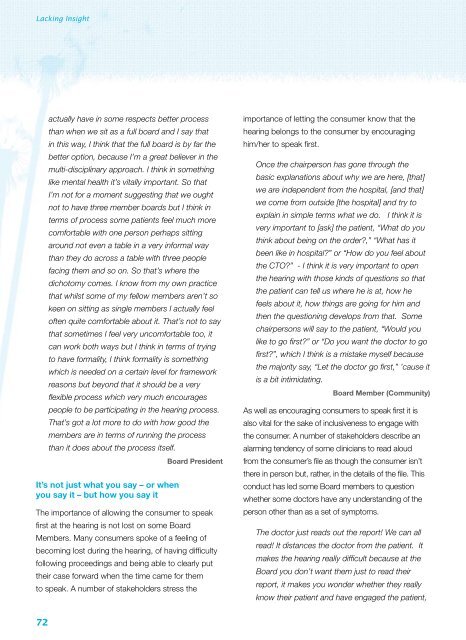Lacking Insight - Community Law
Lacking Insight - Community Law
Lacking Insight - Community Law
- No tags were found...
Create successful ePaper yourself
Turn your PDF publications into a flip-book with our unique Google optimized e-Paper software.
<strong>Lacking</strong> <strong>Insight</strong>actually have in some respects better processthan when we sit as a full board and I say thatin this way, I think that the full board is by far thebetter option, because I’m a great believer in themulti-disciplinary approach. I think in somethinglike mental health it’s vitally important. So thatI’m not for a moment suggesting that we oughtnot to have three member boards but I think interms of process some patients feel much morecomfortable with one person perhaps sittingaround not even a table in a very informal waythan they do across a table with three peoplefacing them and so on. So that’s where thedichotomy comes. I know from my own practicethat whilst some of my fellow members aren’t sokeen on sitting as single members I actually feeloften quite comfortable about it. That’s not to saythat sometimes I feel very uncomfortable too, itcan work both ways but I think in terms of tryingto have formality, I think formality is somethingwhich is needed on a certain level for frameworkreasons but beyond that it should be a veryflexible process which very much encouragespeople to be participating in the hearing process.That’s got a lot more to do with how good themembers are in terms of running the processthan it does about the process itself.Board PresidentIt’s not just what you say – or whenyou say it – but how you say itThe importance of allowing the consumer to speakfirst at the hearing is not lost on some BoardMembers. Many consumers spoke of a feeling ofbecoming lost during the hearing, of having difficultyfollowing proceedings and being able to clearly puttheir case forward when the time came for themto speak. A number of stakeholders stress theimportance of letting the consumer know that thehearing belongs to the consumer by encouraginghim/her to speak first.Once the chairperson has gone through thebasic explanations about why we are here, [that]we are independent from the hospital, [and that]we come from outside [the hospital] and try toexplain in simple terms what we do. I think it isvery important to [ask] the patient, “What do youthink about being on the order?,” “What has itbeen like in hospital?” or “How do you feel aboutthe CTO?” - I think it is very important to openthe hearing with those kinds of questions so thatthe patient can tell us where he is at, how hefeels about it, how things are going for him andthen the questioning develops from that. Somechairpersons will say to the patient, “Would youlike to go first?” or “Do you want the doctor to gofirst?”, which I think is a mistake myself becausethe majority say, “Let the doctor go first,” ’cause itis a bit intimidating.Board Member (<strong>Community</strong>)As well as encouraging consumers to speak first it isalso vital for the sake of inclusiveness to engage withthe consumer. A number of stakeholders describe analarming tendency of some clinicians to read aloudfrom the consumer’s file as though the consumer isn’tthere in person but, rather, in the details of the file. Thisconduct has led some Board members to questionwhether some doctors have any understanding of theperson other than as a set of symptoms.The doctor just reads out the report! We can allread! It distances the doctor from the patient. Itmakes the hearing really difficult because at theBoard you don’t want them just to read theirreport, it makes you wonder whether they reallyknow their patient and have engaged the patient,72
















